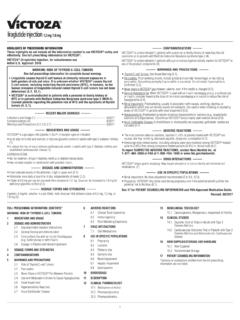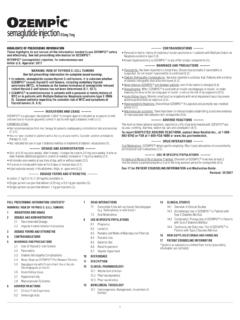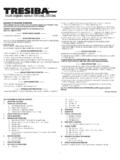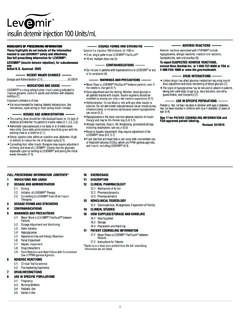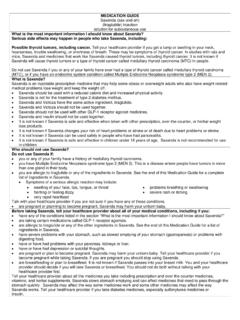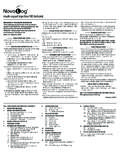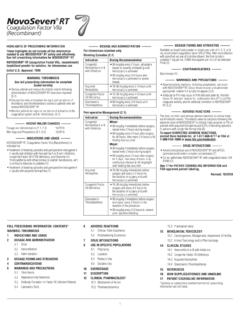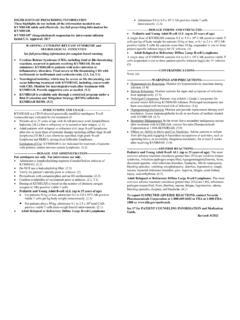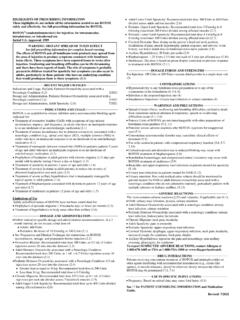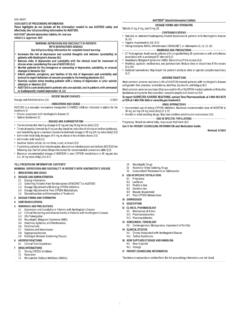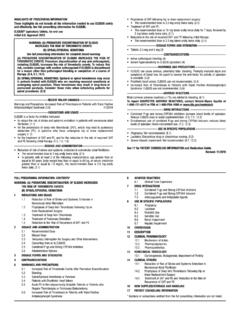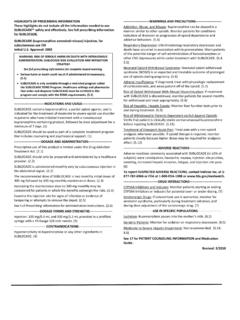Transcription of HIGHLIGHTS OF PRESCRIBING INFORMATION • Inject ...
1 1 Inject subcutaneously in the abdomen, thigh or upper arm ( ). Initiate at mg once weekly for 4 weeks. In 4 week intervals, increase the dose until a dose of mg is reached ( ). The maintenance dose of WEGOVY is mg once weekly ( ). In patients with type 2 diabetes, monitor blood glucose prior to starting and during WEGOVY treatment. DOSAGE FORMS AND STRENGTHS Injection: pre-filled, single-dose pen that delivers doses of mg, mg, 1 mg, mg or mg (3). CONTRAINDICATIONS Personal or family history of medullary thyroid carcinoma or in patients with Multiple Endocrine Neoplasia syndrome type 2 (4, ).
2 Known hypersensitivity to semaglutide or any of the excipients in WEGOVY (4). WARNINGS AND PRECAUTIONS Thyroid C-cell Tumors: See boxed Warning ( ). Acute Pancreatitis: Has occurred in clinical trials. Discontinue promptly if pancreatitis is suspected. Do not restart if pancre-atitis is confirmed ( ). Acute Gallbladder Disease: Has occurred in clinical trials. If cholelithiasis is suspected, gallbladder studies and clinical follow-up are indicated ( ). Hypoglycemia: Concomitant use with an insulin secreta-gogue or insulin may increase the risk of hypoglycemia, including severe hypoglycemia.
3 Reducing the dose of insulin secretagogue or insulin may be necessary. Inform all patients of the risk of hypoglycemia and educate them on the signs and symptoms of hypoglycemia ( , ). Acute Kidney Injury: Has occurred. Monitor renal function when initiating or escalating doses of WEGOVY in patients reporting severe adverse gastrointestinal reactions or in those with renal impairment reporting severe adverse gastrointes-tinal reactions ( ). Hypersensitivity: Anaphylactic reactions and angioedema have been reported postmarketing. Discontinue WEGOVY if suspected and promptly seek medical advice ( ).
4 Diabetic Retinopathy Complications in Patients with Type 2 Diabetes: Has been reported in trials with semaglutide. Patients with a history of diabetic retinopathy should be monitored ( ).FULL PRESCRIBING INFORMATION : CONTENTS*WARNING: RISK OF THYROID C CELL TUMORS1 INDICATIONS AND USAGE2 DOSAGE AND ADMINISTRATION Patient Selection Important Administration Instructions Recommended Dosage3 DOSAGE FORMS AND STRENGTHS4 CONTRAINDICATIONS5 WARNINGS AND PRECAUTIONS Risk of Thyroid C-Cell Tumors Acute Pancreatitis Acute Gallbladder Disease Hypoglycemia Acute Kidney Injury Hypersensitivity Diabetic Retinopathy Complications in Patients with Type 2 Diabetes Heart Rate Increase Suicidal Behavior and Ideation6 ADVERSE REACTIONS Clinical Trials
5 Experience Immunogenicity Postmarketing Experience7 DRUG INTERACTIONS Concomitant Use with an Insulin Secretagogue ( , Sulfonylurea) or Insulin Oral Medications8 USE IN SPECIFIC POPULATIONS Pregnancy Lactation Females and Males of Reproductive Potential Pediatric Use Geriatric Use Renal Impairment Hepatic Impairment10 OVERDOSAGE11 DESCRIPTION12 CLINICAL PHARMACOLOGY Mechanism of Action Pharmacodynamics Pharmacokinetics13 NONCLINICAL TOXICOLOGY Carcinogenesis, Mutagenesis, Impairment of Fertility14 CLINICAL STUDIES Weight Management Studies in Adults with Overweight or Obesity Effect of WEGOVY on Anthropometry and Cardio-metabolic Parameters Cardiovascular Outcomes Trial of Semaglutide mg and 1 mg in Patients with Type 2 Diabetes and Cardiovascular Disease16 HOW SUPPLIED/STORAGE AND HANDLING17 PATIENT COUNSELING INFORMATION *Sections or subsections omitted from the full PRESCRIBING INFORMATION are not OF PRESCRIBING INFORMATIONT hese HIGHLIGHTS do not include all the INFORMATION needed to use WEGOVY
6 Safely and effectively. See full PRESCRIBING INFORMATION for WEGOVY .WEGOVY (semaglutide) injection, for subcutaneous use Initial Approval: 2017 WARNING: RISK OF THYROID C CELL TUMORSSee full PRESCRIBING INFORMATION for complete boxed warning. In rodents, semaglutide causes thyroid C-cell tumors at clinically relevant exposures. It is unknown whether WEGOVY causes thyroid C-cell tumors, including medullary thyroid carcinoma (MTC), in humans as the human relevance of semaglutide-induced rodent thyroid C-cell tumors has not been determined ( , ). WEGOVY is contraindicated in patients with a personal or family history of MTC or in patients with Multiple Endocrine Neoplasia syndrome type 2 (MEN 2).
7 Counsel patients regarding the potential risk of MTC and symptoms of thyroid tumors (4, ). INDICATIONS AND USAGE WEGOVY is a glucagon-like peptide-1 (GLP-1) receptor agonist indicated as an adjunct to a reduced calorie diet and increased physical activity for chronic weight management in adult patients with an initial body mass index (BMI) of 30 kg/m2 or greater (obesity) or 27 kg/m2 or greater (overweight) in the presence of at least one weight-related comorbid condition ( , hypertension, type 2 diabetes mellitus, or dyslipidemia). (1)Limitations of Use: WEGOVY should not be used in combination with other semaglutide-containing products or any other GLP-1 receptor agonist (1).
8 The safety and efficacy of coadministration with other products for weight loss have not been established (1). WEGOVY has not been studied in patients with a history of pancreatitis (1). DOSAGE AND ADMINISTRATION Administer WEGOVY once weekly, on the same day each week, at any time of day, with or without meals ( ). Heart Rate Increase: Monitor heart rate at regular intervals ( ). Suicidal Behavior and Ideation: Monitor for depression or suicidal thoughts. Discontinue WEGOVY if symptoms develop ( ). ADVERSE REACTIONS The most common adverse reactions, reported in greater than or equal to 5% of patients treated with WEGOVY are: nausea, diarrhea, vomiting, constipation, abdominal pain, headache, fatigue, dyspepsia, dizziness, abdominal distension, eructation, hypoglycemia in patients with type 2 diabetes, flatulence, gastroenteritis, and gastroesophageal reflux disease ( ).
9 To report SUSPECTED ADVERSE REACTIONS, contact Novo Nordisk Inc., at 1-833-934-6891 or FDA at 1-800-FDA-1088 or DRUG INTERACTIONS WEGOVY delays gastric emptying. May impact absorption of concomitantly administered oral medications. Use with caution ( 7. 2 ) . USE IN SPECIFIC POPULATIONS Pregnancy: May cause fetal harm. When pregnancy is recognized, discontinue WEGOVY ( ). Females and Males of Reproductive Potential: Discontinue WEGOVY at least 2 months before a planned pregnancy because of the long half-life of semaglutide ( ).See 17 for PATIENT COUNSELING INFORMATION and Medication Guide.
10 Revised: 06/2021 Wegovy (semaglutide) injection mg2 FULL PRESCRIBING INFORMATIONWARNING: RISK OF THYROID C CELL TUMORS In rodents, semaglutide causes dose-dependent and treat-ment-duration-dependent thyroid C-cell tumors at clinically relevant exposures. It is unknown whether WEGOVY causes thyroid C-cell tumors, including medullary thyroid carcinoma (MTC), in humans as human relevance of semaglutide-induced rodent thyroid C-cell tumors has not been determined [see Warnings and Precautions ( ) and Nonclinical Toxicology ( )]. WEGOVY is contraindicated in patients with a personal or family history of MTC or in patients with Multiple Endocrine Neoplasia syndrome type 2 (MEN 2) [see Contraindications (4)].
